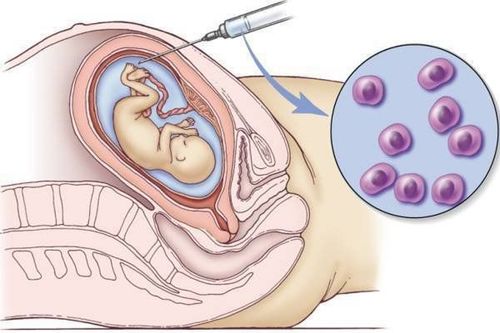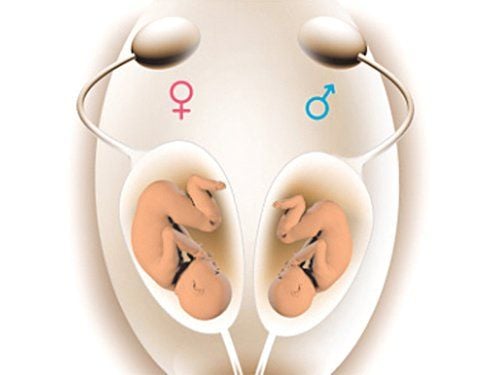This is an automatically translated article.
During pregnancy, you will probably get a lot of mixed opinions about your body and your baby. One of the most common topics of discussion is whether the baby you are carrying is a boy or a girl. There are many myths about how to determine the sex of a baby and other folk tales about this issue. Here's some information to help you understand the facts about child sex determination.
1. When is the sex of the fetus determined?
Your baby's sex is formed as soon as the sperm meets the egg. It is the time of conception when a child receives 23 chromosomes from each of their parents. Along with gender, things like eye color, hair color, and even intelligence were determined.
Your baby's genitals begin to develop around the 11th week of pregnancy. However, you usually won't be able to find out your sex until a few more weeks with an ultrasound.

Giới tính của con bạn được hình thành ngay sau khi tinh trùng gặp trứng.
2. Folk tales about fetal sex
Here are five of the most popular ex-wives' stories about the sex of your child. Remember, none of these stories are based on facts. They are just rumors and simply for fun.
2.1. Morning sickness
You may have heard that the severity of morning sickness is a clue about your baby's gender.
With female fetuses, hormone levels are thought to be higher. For that reason, you will experience more morning sickness. With boys, you'll usually have less morning sickness and the pregnancy will be relatively smooth sailing.
The truth is that morning sickness can be different for every woman and stage of pregnancy. A study published in The Lancet revealed that women who experienced severe morning sickness during pregnancy were more likely to have a baby girl. On the other hand, however, there is not much scientific evidence to support this hypothesis.
2.2. Skin condition
Some people believe that a baby girl steals her mother's beauty. In contrast, boys won't give you a lot of acne.
A similar story involves hair growth. If you're a boy, your hair will be longer and shinier. If you are a girl, your hair will be thin and frizzy.
All is not true. Hormone development is complex during pregnancy and affects each woman differently. Washing your face regularly can help reduce acne.
2.3. Appetite
It is said that, if you are pregnant with a boy, you will crave salty foods like pickles and chips. If you're pregnant with a girl, you'll crave sweets and chocolate.
In fact, there are no studies that have concluded cravings as an accurate predictor of gender. Those cravings may be due to your changing nutritional needs.

Không có nghiên cứu nào kết luận cảm giác thèm ăn như một yếu tố dự đoán chính xác về giới tính.
2.4. Heartbeat
One of the most common misconceptions about gender revolves around your baby's heart rate. If the pulse is below 140 per minute, the baby is said to be a boy. Taller than 140, it was said to be a girl.
Unfortunately, even though this sounds more scientific, it's also not true. A study published in the journal Fetal Diagnosis and Therapy revealed that there was no significant difference between the heart rates of boys and girls during early pregnancy.
2.5. Uterus shape
If the shape of the uterus is low, you may be having a boy. If the figure is tall, it could be a girl. In fact, whether you're pregnant with a boy or a girl has little to do with the shape of your uterus, your body shape, or your abs.
3. How to early identify the sex of the fetus?
Although the gender is set from the start, you may need to wait a while to know for sure if it's a boy or a girl. There are several ways you can find out your baby's gender sooner, including:3.1. Free Cell DNA Blood Test
You can have a blood test as early as 9 weeks pregnant. This test can reveal the sex of your baby. Free Cell DNA Tests - NIPTs like Panorama work during pregnancy because your blood carries traces of your baby's DNA. You take a blood sample, send it to a lab, and get the results in about 7 to 10 days.
However, gender disclosure is not the primary goal of these tests. This is actually the initial test to diagnose Down syndrome and other genetic conditions. Knowing the gender is only an additional outcome.
3.2. Other genetic testing
You may have amniocentesis or chorionic villus sampling (CVS) during pregnancy. These tests are similar to free-cell DNA blood tests but they are more invasive. Like free cell DNA tests, they can tell you the sex of your baby.
CVS is usually done between 10 and 12 weeks. Amniocentesis is done between 15 and 18 weeks. If all you want to find out is the sex of your baby, you can skip these tests. They do carry some risk of miscarriage and are generally only recommended for older women or couples with a family history of certain genetic conditions.

Chọc ối hoặc lấy mẫu nhung mao màng đệm (CVS) không được khuyên làm vì mang một số nguy cơ gây sảy thai.
3.3. Supersonic
You can usually find out the sex of your baby with an ultrasound. This will be done between 18 and 20 weeks.
The sonographer will see an image of your baby on a monitor and examine the genitals for different markers that suggest a boy or a girl . This is part of a larger anatomical scan.
Even if you have an ultrasound, the technician may not be able to determine the sex of your baby in some cases. If your baby is not “cooperating” and is in an ideal position, you may need to rescan or wait longer.
Finding out your baby's gender is a fun thing. Chances are, you will hear about many ways to predict this important news. However, remember, most of the stories and theories about this matter are not based on fact. Be patient and you will soon find out the gender of your baby.
Knowing the baby's sex will help parents better take care of and prepare to welcome the baby. However, the most important thing is that the fetus is healthy, born safely, the baby born whether it is a boy or a girl is still an angel that needs to be cherished and cared for carefully.
Usually, to determine the sex of the fetus, pregnant women often use fetal ultrasound. However, the accuracy will depend a lot on modern equipment and the qualifications of the doctor. Therefore, you should go to reputable medical facilities for examination.
Vinmec International General Hospital is a high-quality medical facility that is highly appreciated by customers for its quality of examination and treatment as well as professional services. Vinmec has the most modern equipment system, with the most advanced ultrasound machines in the world and a team of experienced obstetricians in diagnosing fetal sex.
In addition, to protect the health of mother and baby comprehensively, Vinmec offers a variety of package Maternity services. With this package, pregnant women will have regular prenatal check-ups with specialist doctors. Perform prenatal and postnatal screening tests for the baby. During pregnancy, if a pregnant woman encounters any abnormal health problems, she will be consulted and treated by a specialist doctor. After each visit, the doctors will analyze the ultrasound and test results and advise on health care, nutrition, and rest suitable for each pregnant woman, helping the mother and fetus to be healthy. well developed, uniform indicators.
Please dial HOTLINE for more information or register for an appointment HERE. Download MyVinmec app to make appointments faster and to manage your bookings easily.
Reference source: healthline.com













